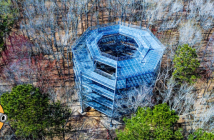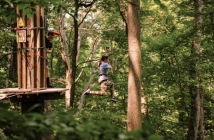When Maryland’s Terrapin Adventures opened for business in 2009, then-owner Matt Baker knew he wanted to cater to groups, but didn’t quite know what that would look like. The hybrid-model park was built with both recreational and group business in mind, and though the expectation was that it would be hosting more recreational guests, the demand for group biz turned out to be greater than anticipated.
“There was a lot of interest from the group market early on,” recalls current owner Steve Carne, who purchased Terrapin from Baker last year after working there from 2010 to 2016. “Matt was good at connecting with the local community, schools, teachers, etc., and it just sort of grew from there.”
Carne says in those early days, Baker made it a priority to address local groups and found creative ways to do so: attending PTA meetings, running promotional days for teachers, and making it known that the facility was built to accommodate school groups. Today, Carne estimates that youth/school groups account for 35-40 percent of overall business, with other groups, including corporate team-building and parties, comprising another 10-15 percent.
A similar community-forward strategy has paid off for other adventure parks seeking a toehold in the group market as well. And as group business—once thought more a product for traditional facilities—has ebbed into the pay-to-play realm, park operators hoping to tap into this market have a lot to consider.
KNOW YOUR TARGET DEMOGRAPHIC
Lee Cohen, leisure sales manager at Vermont’s Killington and Pico resorts, focuses his summertime efforts on bringing recreational group business to Killington’s Adventure Center, which includes dual zip lines, a ropes course, an Amaze’n Maze, a mountain coaster, and more. Cohen says when considering what sorts of groups you’d like to attract, it’s important to recognize your facility’s capabilities and to whom your activities are geared toward.
CAPTURING YOUTH. Killington targets local youth markets rather than corporate business because its Adventure Center activities skew toward a slightly younger crowd. “Youth organizations are a great market,” says Cohen. “It works well for us to reach out to intown organizations, and we’ve found that summer organizations, like camps and rec-park groups, have been the most successful for us.”
Cohen advises that, like Terrapin, parks looking to tap into this market should actively target local schools and also consider aligning their operational schedules with those local rec organizations to maximize opportunity. Killington has had success with midweek specials in the summer to attract this market. Groups of 12 or more are offered 20-50 percent off the retail ticket rate. Cohen says it’s a selling point for youth groups that are working within a strict budget.
LOOKING LOCAL. Quarry Park Adventures, Calif., did brisk group business in 2019—its first year open—primarily through simple community outreach and digital marketing (targeted Google ads, select social media ads, email marketing to group leaders). Having a robust local presence and a media relations strategy that produced frequent in-market coverage helped get its name out, says marketing director Abby Burt.
Quarry Park has found great success with various groups, including the area’s large, active religious community, which Burt says is typically looking for outings that appeal to youth and families or fullday “event-type” venues. She predicts post-Covid, groups will account for 25 percent of guest traffic annually.
THE TOURIST MARKET. At Kawanti Adventures in Alaska, groups accounted for 93 percent of business in 2021, most of which arrived via the three to five cruise ships that come into Ketchikan’s harbors each day. VP of operations Christa Hagan considers cruise-ship folks “group business,” as they’re getting on buses and being transferred to the park en masse. It’s a distinct business model that works due to the park’s location and tourist economy.
Kawanti tailors its offerings to capture that market. It offers its tour on a prebooked basis to cruise lines in advance of an upcoming season. The cruise ships receive a net rate and essentially sell the tour to their customers. Kawanti pre-plans blocks of space and knows what groups will feed into the system in advance. Blocks can be moved and assigned to different groups, depending on booking rates. “We’ve mapped out our entire season in advance,” says Hagan. “Our system is unique, but other parks could manage their inventory in a similar way.”
Park staff also work with the local visitor’s bureau and Alaska travel groups to bring school groups in, and they do direct marketing via hotels and lodges, which they make sure to educate about their availability for groups. Hagan says when it comes to group business, it’s important to consider what type of visitor is coming through your community, what type of booking engine is bringing those groups in, and how to build a great relationship with whoever will be selling the activity.
LOGISTICS AND COMMUNICATION
A skilled sales staff that can consistently, effectively, and patiently work with groups through the booking process is key to capturing the group market, says Burt.
IT TAKES COMMITMENT. “If you’re short staffed or don’t have the excess time to devote to really developing a comprehensive group sales program,” she says, “it’s probably more to your advantage to focus on the everyday business you do have.” “
I fundamentally believe you need a dedicated process for booking groups, with individuals who understand them and what their needs are,” agrees Carne. “Groups are looking for a guided process; they’re looking for someone to lay out the sales process and what the day will look like. Staff that has thought out all the logistics and people who have the know-how to usher groups through the process makes for an easier experience.”
For large groups, it’s important to set proper expectations, says Burt. “What do we expect of the guests? What do we need to make certain that leaders share with their group prior to arriving on site? Conversely, what do they need to know from us about how our product and a day with us actually works? This is probably the biggest challenge—making sure we have great two-way communication during the sales process.”
ACCOMMODATE NEEDS. Groups also have different needs, points out Carne. “Recreational needs aren’t the same as group needs. It doesn’t work well if you’re trying to shoehorn groups into a recreational style. Sixty kids getting off a bus need to use a restroom,” which would not be a scenario with recreational guests, so you need to think through what the group may need, he says.
Some parks find it advantageous to partner with local venues to help accommodate larger groups. Quarry Park taps a nearby city-owned amphitheater that provides additional space for a “total park rental” and an entertainment option, if necessary. Terrapin, which has several indoor meeting rooms on property, partners with neighboring community halls and properties for larger (100-200 people) groups.
STAFFING ADVANTAGES. Though complex at times, groups can actually have a positive impact on staffing, says Burt. “They can actually lead to excellent efficiency in staffing because (most of the time) we have a set headcount before going into the operational day and can staff accordingly. In our case, this typically means we have a higher profit margin with very large groups than we might have on a normal day.”
TRADITIONAL ROOTS
In addition to youth groups, Terrapin was constructed to accommodate traditional team-building, and does a lot of it. When it comes to sales and staffing, Carne says recreational and traditional groups are two different beasts. Terrapin’s school programs, for example, which combine traditional and recreational, are pre-established, structured products that are fairly consistent from group to group. Its “Base Camp” offering runs 3-4 hours, with zip lining, team building, and a lunch break. Large school groups typically bring 60-100 kids, which are subdivided into groups of 12-15.
Conversely, Terrapin’s team-building programs, which make use of more traditional elements, like the low ropes course, are entirely customized and targeted toward corporate groups. “We really want to provide the exact program a corporate group wants,” says Carne.
AN INVOLVED PROCESS. Similar to rec groups, these calls begin with a dedicated sales team to discuss needs. “What are their group objectives, needs, food requirements, etc.?” asks Carne. “From there, we custom build a program based on their desires.”
To facilitate team-building programming, Terrapin leverages its trained on-staff facilitators, some of whom have a decade’s experience. In general, park staff, including facilitators, are trained and moved around in various roles to accommodate groups, says Carne.
As with more recreational groups, marketing to corporate groups includes connections with the local chamber of commerce and tourism boards and having a true community presence.
GET INTO GROUPS
If you’re in a locale where group sales opportunities are ripe, and your operation is set up to handle volume and group needs, you might consider diving into the group market, suggests Burt.
MARKET IT. “Develop pages on your website that detail what you have to offer groups, and do the work (or hire someone who knows how) to get those pages seen by people who may be interested,” she says. “Create an advertising plan and budget that is specific to group sales so that you can track your success. Make sure you’re honest about how suited your business is, or isn’t, for very large groups.”
Successfully hosting groups can result in the best—and cheapest—form of marketing there is: word of mouth. “The advantages of welcoming a large group—and executing their day exceptionally well—means we send that many more ambassadors out into the community who will speak positively about Quarry Park,” says Burt.
Carne agrees. “Having group business allows adventure parks to get their product out to more people, so more people can experience what they have to offer,” he says. “It ends up feeding recreation business, and vice versa.”
Learning the ropes of group business has definitely been trial and error for Terrapin, Carne notes, and borrowing some tenets of traditional team-building has helped the business refine its programming. “We’re big believers in the process of debriefing, learning, and growing. We learn today and successfully grow tomorrow—we actively do that every day and will continue to do so.”










